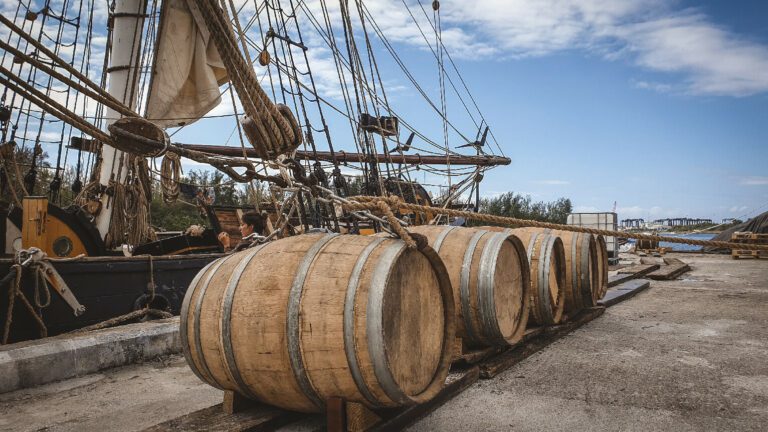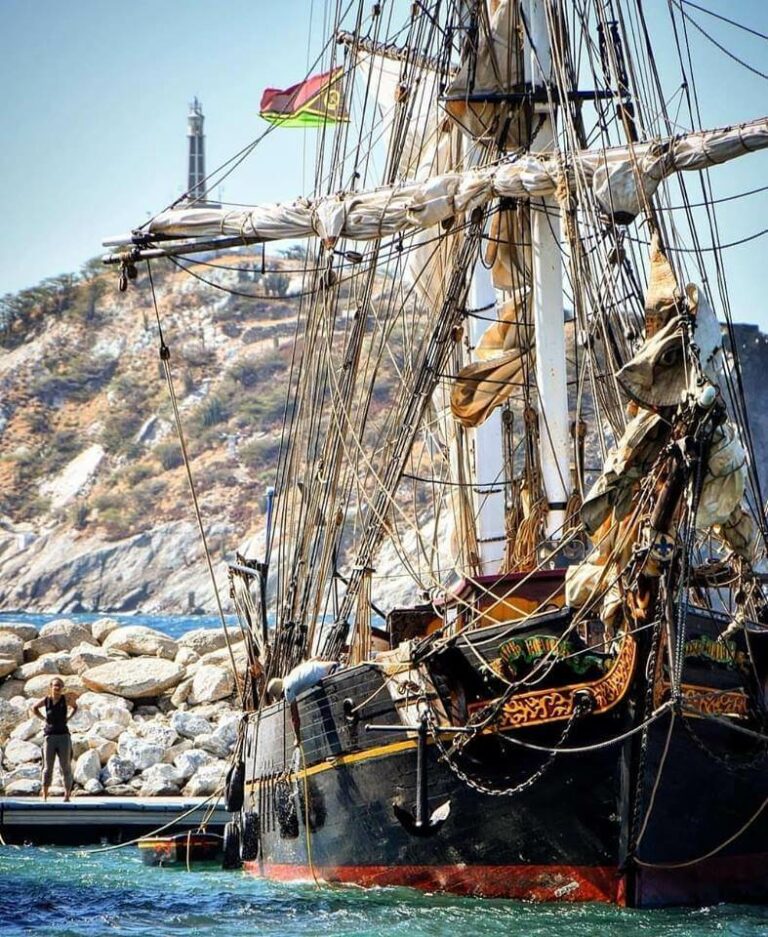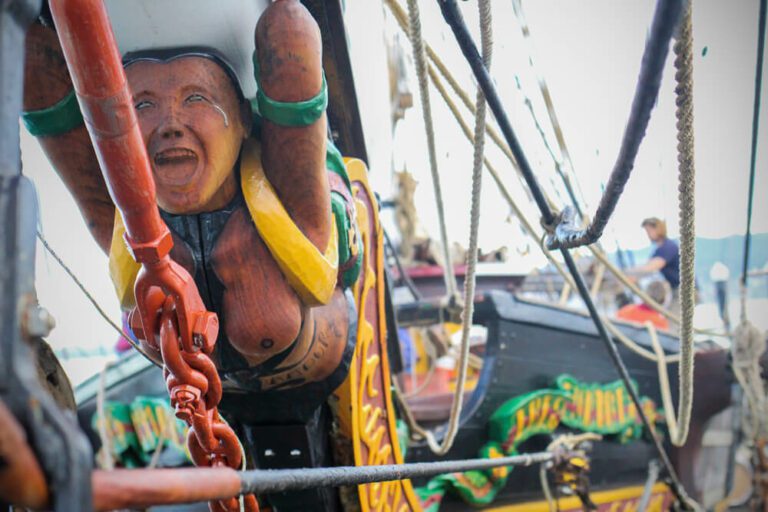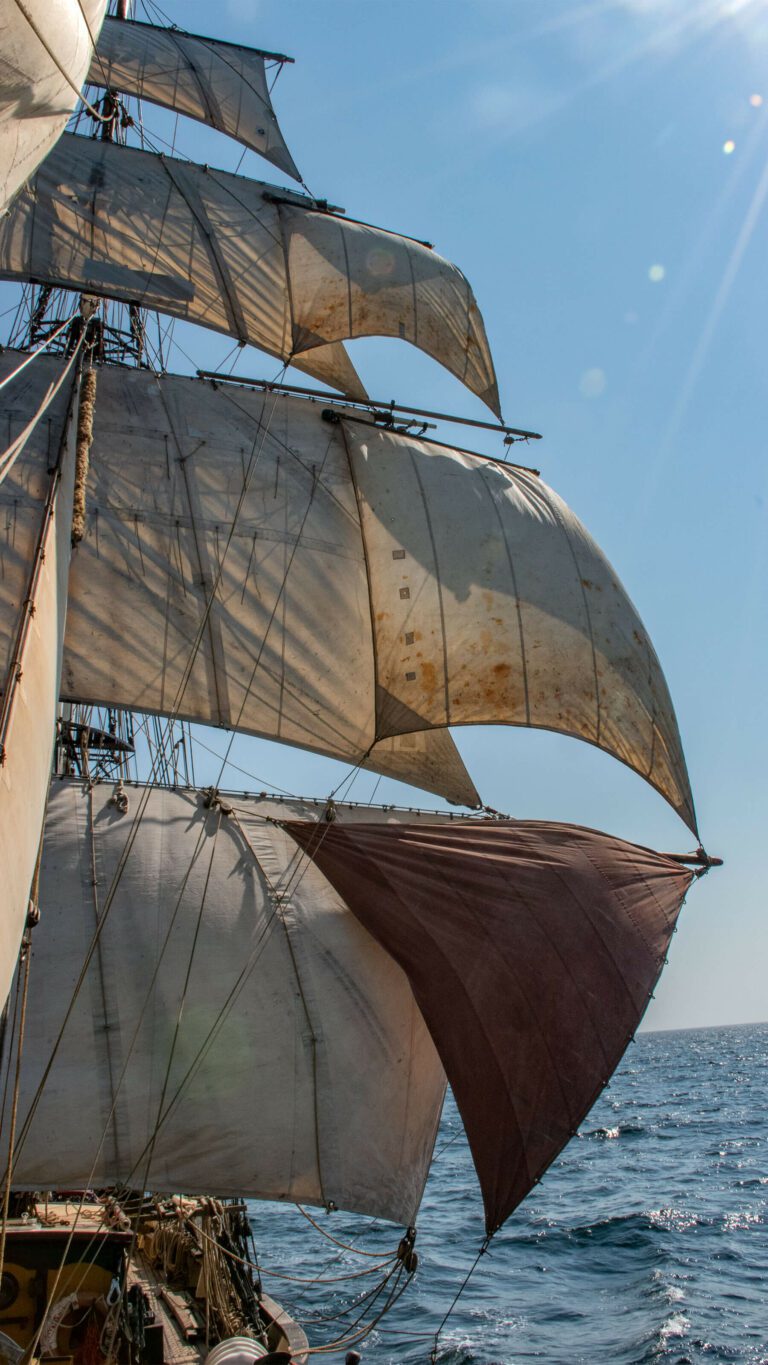So here we are, back in Amsterdam, with an empty cargo hold, preparing for the next trip.
Six months have passed since we first left Den Helder on that gray November day. I still remember the steady sound of the tugboat, like a frantic clock rushing us. Soon the time wouldn't matter that much, but we didn't know that yet. After 3 months of refit, a perfectly black hull and a whole new rigging, she was most definitely ready to go, and so we were. But we still needed our flag, and that bean soup and Jeroen had a few more teas and spices to give us, and from the lovely people standing by the quay, we still had herbs, potatoes, pumpkins and so many fair winds wishes to receive . I remember being hit by all kinds of unexpected emotions and also not having a second to process any of them. The last hugs were shared as the mooring lines were set loose. As she slowly moved away from the pier and the embraces were no longer possible, there came the handshakes and finally, only words and smiles could connect both worlds. There was a special atmosphere surrounding that moment; serious but not heavy. And as we disappeared around the corner, setting sails already, we had no idea what to expect. Then the North Sea and getting to know these 19 people with whom we were going to share part of this adventure came.
We had a whole new world to learn about and master. Rope names and their functions, maneuver logistics, climbing, steering, even simple walking on a moving deck or sleeping on a rolling bunk is a skill that requires practice. Each one of us was pretty soon faced with his and her own battles. Seasickness for some, freezing wet feet for most, tiredness, sleep deprivation, feeling generally overwhelmed, you name it, it was a tough start especially for the ones sailing for the first time!
Then Biscay came and I realized we are more human when we are reminded of our vulnerabilities. A warm soup made by a trainee when I was too sick to work, a pat on the shoulder when bending over the railing, an understanding look that speaks for a thousand words, the relentless work from the experienced sailors on board, allowing the others to get back on their feet…all these were true expressions of love that I will never forget.
It took time for me to be friends with the rolling galley. She wouldn't give in that easily, but I tend to fall for untamed spirits. I had to find out the hard way how to stand and hold my position. Feet were no longer enough since you need 3 points of balance; so butt, hips, knees and back were put to work. Mise en place was made obsolete. All the bowls with prepared veggies would just fly away with the first wave anyway.
You must chop as you go. Elbows, wrists, even the pinkie fingers are fully used daily to keep everything in place. Your senses become alert to any sounds and movements, but careful not to go crazy with the ever symphony of pots and pans hitting the walls. You learn pretty fast that if we are sailing full and by, you shouldn't make lasagna; the entire top layer will slide out of the tray and burn on the bottom of your oven. You learn that making pasta on a heavy sailing day heightens the mood greatly, but you will need all your prayers to strain that boiling water safely.
You learn about each person's specifications; how full the bowl should be for each one, who likes runny or hard eggs or who prefers forks over spoons.
Soon after we would be in Baiona rolling empty barrels by hand over the quay and partying with my parents on board and with a new captain we headed south towards La Palma. Some said sailing would be smoother from then on but the sea does what the sea wants. The reliable starry skies were always there though, reminding me of permanence while outside and inside everything was shaking. I didn't know back then, but there was going to be the last time I would ask myself: can I actually do this? Because then came the Atlantic crossing and a love story was born.
We would be three and a half weeks at sea and, with 70kg of bananas and 30kg of avocados in the cargo hold, we were definitely going to manage. We aimed south until the butter started to melt and then hitchhiked with the good old trade winds all the way to the west.
Downwind sailing, blue skies and sunshine completely changed the mood of the crew. It was time to start living and enjoying life on board. We could finally dry all our damp clothes and have showers on deck. Guitars were taken out and songs were sung and written again. Without much sail handling to do, the days were spent doing maintenance work. Tarring, seizing, sanding, oiling, painting, tensioning, pitching, de-rusting, splicing, sewing; all this needs to be done regularly. It is a lot of work to keep such a ship in shape.
In the galley, life was much easier though. If in fact, life was great! I was feeling more and more synchronized with everything, my body had accepted the daily schedules, the sounds, the movement. And as each meal was served I felt more confident and soon cooking for the whole crew wouldn't be any different than cooking for myself at home. The days onboard were simple. All actions were concrete and necessary for living; cooking, cleaning, fixing, sailing. And there was always time. It is mind-blowing how much space is left when you are not constantly bombarded with abstract nonsense. I was pleased. I felt at peace with my place in the world, at least in this floating world. I remember lying on deck one night, under the most brilliant sky, looking up at the sails and the moon and Venus shining over them. I did not know whether to feel big or small. But I understood then that there is no scale for such feelings of meaningfulness.
One day, when the wind didn't blow, we decided to put the tender overboard and do a few laps around the ship to take some pictures. That was the day we truly realized it: we are really crossing the Atlantic on a pirate ship. And just like going to space and looking back at Earth, we all stared at her from the distance in awe and reverence. She was everything we had and the only place we were safe within a radius of hundreds, maybe thousands of miles. That day we all came back on board with a renewed sense of care and responsibility, and I wondered how would the world be if more people were able to step out of their lives and take a look from a different perspective.
Anyway, the Caribbean was getting closer and, although I didn't want the crossing to end, we would finally eat something else rather than pumpkin and bananas and I was also curious for what the West would bring. Barbados was our first stop. We dropped one of our anchors on the bay of Bridgetown and as it touched the ground our captain yelled, “Welcome in the Caribbean” and we all cheered, already imagining all the land pleasures we were going to feast on! But it would take us another 6 hours of hard-core teamwork until we could finally reach land since we soon realized that the anchor wasn't holding!
With squalls in the horizon and other boats all around us, we had to be quick and pull that anchor up, so we could sail away from the bay and try again. But on a traditional ship like ours, without an engine or modern technology, bringing up an anchor means that the whole crew is taking turns sweating under the sun pulling like crazy. After two hours we were ready to try again. We chose another spot, let go of the anchor, crossed our fingers and waited in silence…damn, it wasn't holding again! We dropped a few more shackles, nothing changed. We drop our second anchor and still not holding. Now we had two anchors to pull up! Make water bottles ready, we were going to be pulling non-stop for another hour or more. This time was going to be the last time we would try anchoring, since the crew was exhausted and staring after 6h of pulling, tacking, jibing, and running around hoisting and dousing sails. We approached the bay once more, the captain screams “Tres Hombres let go!” and for the third time, we hear the anchor dropping. With four and a half shackles in, she was definitely holding this time!
From then on a different life on board began. Land time became longer than sea time and that had its positive and negative sides. We could rest from the discipline and focus needed at sea but we were also vulnerable again to all land distractions, bureaucracies and stress. But we had a job to do and so we started our island hopping to collect the good cargo. In Martinique, we had a group of people swimming full rum barrels across the bay. We met the Gallant and moored side by side for a memorable barbeque on board. We could taste the French croissants and baguettes again and I discovered the magic of rum punch.
In Grenada, we roamed through spice markets, jumped in waterfalls and with other kindred spirits. We were also introduced to soca music and a bit more rum punch. Arriving in Colombia meant all hands on deck and surviving a storm for one full night. But what doesn't kill you makes you stronger they say. In the Dominican Republic, I learned how to negotiate prices, bargain and push my way through the lawless systems. It is undeniable though that problems exist here and in other places we have been. But these issues, such as corruption, for example, derive from deep feelings of unfairness and, as long as there are social and economical disparities in the world, I believe this will be bound to happen. Investing in these countries, helping their internal economies and small-scale businesses, building bridges and connections, rather than just exploiting them for their beautiful nature is, in my view, a good start. And that is what we are doing, on a very small scale.
A friend of mine used to say sometimes that the brightest light casts the darkest shadows. I had to think about that expression when I was in the Dominican Republic because there I have also seen the best in people. I was helped by many strangers and witnessed beautiful and rare gestures of trust and solidarity that made a big impact on me. All hands all day were needed to load our last cargo. I couldn't believe it would ever fit when I saw it by the quay but it just did. There we would hear about the extension of the coronavirus effects, the border closures and quarantine measures for the first time.
We couldn't stay longer in the harbor but we also didn't know where to sail to since the Azores were closing the borders as well as the rest of Europe. But a ship is made for sailing and after the loading was done we were losing our purpose on land. Thus we set sail on a Tuesday morning with a dry store filled with food meant to last for 6 weeks, direction uncertain.
Crossing back though was going to be a very different kind of love story. The trade winds were not going to be there to push us gently from the back. Instead, we would have to navigate our way through the highs and the lows, in an ever colder and wetter environment. I have also realized that the feeling of going back home together with the uncertainties brought by these special times made us less able to truly live and appreciate the present moment. Suddenly time was on our minds again.
When will we arrive? Where will we arrive? Will we have enough food, water, gas? What world will we encounter?
Future sabotages the present. I also had my own private questions. What will I do next? Where will I go next? When I started this journey I chose to leave everything behind. I left my job, my house, sold my car and most of my belongings. Setting sail with no personal mooring lines was the greatest of feelings but I knew that coming back was going to be confusing, to say the least.
The thing is that after you've done one season on Tres Hombres many things you thought were great now seem boring, many things you thought you wanted you don't want them anymore, and sometimes you meet somebody, they steal your heart and with it all the plans you might have made before. But being confused is good; it is an active state of mind. And being alive is to accept change and flow with it like an autumn leaf in the wind. And if the wind is fair it will get you there.
Now that we have completed our mission, and looking back at what we have done, there are two ways of going about it. In practical terms, we have sailed a ship to the Caribbean to collect cargo and we have sailed it back to Europe to deliver cargo. In total, around 40 tons of cocoa, coffee, rum and sugar have been traded. This is what anyway will forever be registered in the paperwork, invoices, logbooks and so on.
But in reality, this was a journey of a lifetime for each individual that stepped on this ship, more so for the ones doing the full round trip. It was confrontational, exciting, provocative, awe-inspiring. It stirred all kinds of thoughts and feelings. It opened up different paths and possibilities. It ignited new questions and dreams.
And I can't help to wonder what the real cargo is in the end, the goods or the people. After all, the fox is right: what is essential is invisible to the eye. So in some ways, I think that the rum we carry is just a necessary mean to make it viable for this vessel to keep sailing and inspiring people. Investing in products with such a story and human beings behind it, is allowing for personal growth and deep life changes, making the world a little bit happier and a little bit healthier a journey at the time. Therefore I must thank everyone that is supporting Fairtransport by buying our products or giving their time and skills to the project. It really got under my skin in ways I am still to process. There is a unique quality given only to things that take time and effort.
So after 200kg of porridge and 176 days of pura vida, if later someone asks me how long my journey was, I'll say somewhere between 6 months and a lifetime.
If you sign up for the newsletter, we will be the first to inform you when we publish new sailing routes. The Fairtransport “Sailmail” is packed with exciting sailing adventures, exotic products and the latest news about the ships and their events. You can't miss this one!









